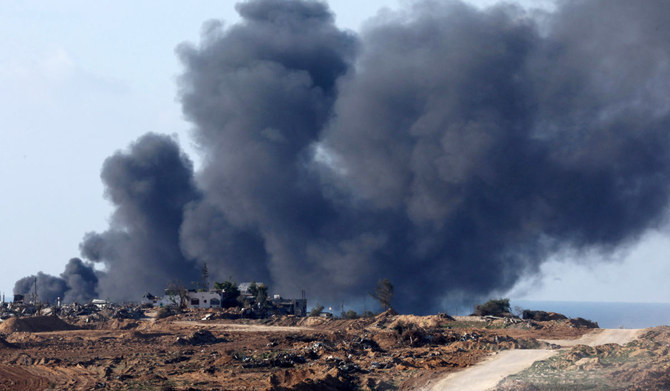JEDDAH: The US and EU’s top diplomats arrived in the Middle East on Friday in a renewed diplomatic push to prevent Israel’s war on Gaza from spilling over to the occupied West Bank and Lebanon.
US Secretary of State Antony Blinken will visit the West Bank during a week-long tour that will take in Saudi Arabia, Turkiye, Israel, Jordan, Qatar, the UAE, Egypt and Greece.
“It is in no one’s interest, not Israel’s, not the region’s, not the world’s, for this conflict to spread beyond Gaza,” State Department spokesman Matthew Miller said. “We don’t expect every conversation on this trip to be easy.”
Josep Borrell, the EU foreign policy chief, was in Lebanon on Friday to discuss the situation at the Israeli border. As he arrived, Hezbollah leader Hassan Nasrallah said the Iran-backed militia had conducted about670 military operations on the border with Israel since Oct. 8, and had destroyed many Israeli military vehicles.
The diplomatic flurry comes almost three months after Hamas militants from Gaza attacked Israel, triggering a retaliatory offensive that has has killed 22,600 Palestinians and devastated the enclave.
Israeli planes and tanks intensified attacks on Friday on the densely populated areas of Al-Maghazi, Al-Bureij and Al-Nusseirat in the center of Gaza. More than 160 people were killed in 24 hours. Four others were killed in an airstrike on a street in Al-Nusseirat, and further south, to where hundreds of thousands of Palestinians have been displaced, six were killed in a strike on Khan Younis.
“The Israeli government claims democracy and humanity, but is inhumane,” Abdel Razek Abu Sinjar said as he cried over the shrouded bodies of his wife and children, killed in an airstrike on his house in Rafah on the border with Egypt.
There was renewed shelling near Al-Amal hospital in Khan Younis, and aid agency Medecins Sans Frontieres said its workers were cornered in southern Gaza and prevented from providing desperately needed help.
In Jabalia in northern Gaza, which has been heavily bombed, people picked their way through ruined streets filled with sewage and garbage. Hunger and deadly diseases are spreading.
The World Health Organization said hospitals and other medical infrastructure in Gaza had been attacked nearly 600 times since the conflict erupted. About 613 people had died in health facilities, it said.
The war has also stoked violence in the occupied West Bank. A 17-year-old boy was killed and four other Palestinians wounded by Israeli army gunfire in the town of Beit Rima. About 300 Palestinians have died in the West Bank since the war began.

























